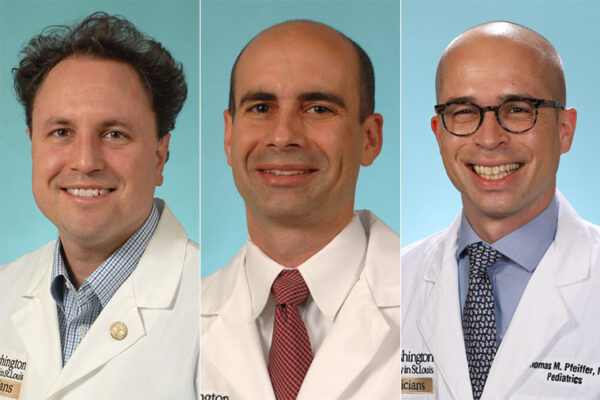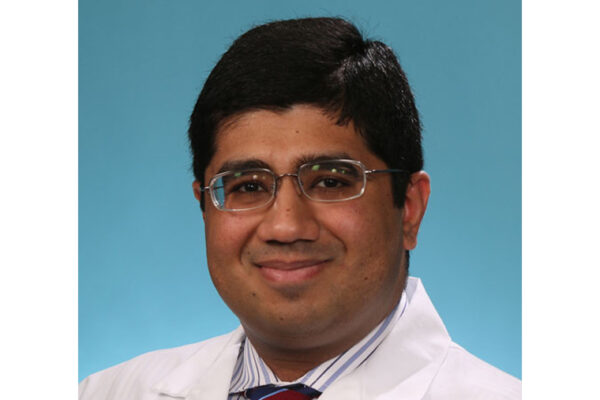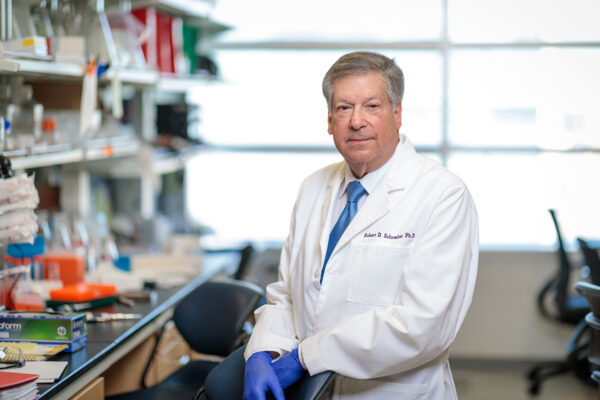Three receive grant for NK cell-based therapy trial for kids with AML
Todd A. Fehniger, MD, PhD, and co-principal investigators Jeffrey J. Bednarski, MD, PhD, and Thomas Pfeiffer, MD, all at the School of Medicine, have received a total of $1.4 million from the Leukemia & Lymphoma Society, the Rising Tide Foundation for Clinical Cancer Research and Siteman Kids to support a clinical trial of a novel cell-based immunotherapy.
Kulkarni recognized for research into complement system
Hrishikesh S. Kulkarni, MD, an assistant professor of medicine in the Division of Pulmonary & Critical Care Medicine at the School of Medicine, has received the 2023 Svar Complement Excellence Award from the International Complement Society and life sciences company Svar.
Gut bacteria of malnourished children benefit from key elements in therapeutic food
New research from the School of Medicine has identified key naturally occurring biochemical components of a novel therapeutic food that is aimed at repairing malnourished children’s underdeveloped gut microbiomes. The findings may help guide treatments for malnutrition.
Smoking causes brain shrinkage
Smoking shrinks the brain and effectively causes premature brain aging, according to a study by researchers at the School of Medicine. The findings help explain why smokers are at high risk of age-related cognitive decline and Alzheimer’s disease.
Ciorba receives grant to evaluate treatment for colorectal cancer
Matthew A. Ciorba, MD, a professor of medicine and director of the Inflammatory Bowel Disease Center at the School of Medicine, has received a $2.8 million award from the National Institutes of Health (NIH) to evaluate a new treatment for colorectal cancer.
Clues to preventing Alzheimer’s come from patient who, despite genetics, evaded disease
A woman who never developed Alzheimer’s despite a strong genetic predisposition may hold the key to stopping the disease in its tracks. Researchers at the School of Medicine found clues that could help cut the link between the early, asymptomatic stage and the late stage, when cognitive decline sets in.
Humphreys receives $4.5 million NIH grant for kidney disease research
Benjamin Humphreys, MD, PhD, at the School of Medicine, has received a five-year $4.5 million grant from the National Institutes of Health (NIH) for research into chronic kidney disease.
Ashrafi receives Ben Barres Early Career Acceleration Award
Ghazaleh Ashrafi, an assistant professor of cell biology and physiology at the School of Medicine, has been awarded a four-year $1.2 million Ben Barres Early Career Acceleration Award as part of the Chan Zuckerberg Initiative’s Neurodegeneration Challenge Network.
Improving heart health to save lives during, after pregnancy aim of programs
Researchers at Washington University in St. Louis and the University of Abuja in Nigeria have received grants to work with community organizations in St. Louis and Abuja to improve cardiovascular health during and after pregnancy.
Schreiber receives scientific innovator award
Robert Schreiber, of Washington University School of Medicine in St. Louis, is the 2024 Senior Scientist Winner of the Innovators in Science Award. The award recognizes his outstanding contributions to the field of cancer immunology.
View More Stories









